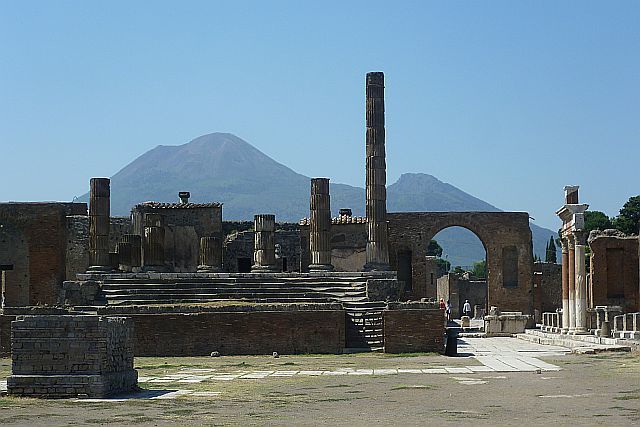During the First Century, war and illnesses were common killers in the Roman Empire. However, in the year 79 CE, Mount Vesuvius would show the city of Pompeii that a natural disaster could bring as much devastation and destruction as anything else.
In the decades before Mount Vesuvius engulfed Pompeii in ashes, an earthquake had struck the region. While the earthquake did not devastate the region, people there did not comprehend the amount of death and destruction that a natural disaster was capable of. In 79 CE, the beautiful and thriving city of Pompeii in the Roman Empire was a popular location for the wealthy and merchants to flock to. Historians have placed the population of Pompeii and neighboring region between 10,000 and 20,000 people. 1 Unfortunately, in the month of August, the city of Pompeii would be transformed from a jewel to ruins by one of the most powerful and devastating natural forces: a volcanic eruption.

Although nature provided warning signs of the catastrophic event that would soon follow, people were not able to comprehend them. Animals were dying because of their lungs being filled with toxic gas, a strong odor filled the countryside of Pompeii, and worse of all, earthquakes rattled the ground below as a result of the pressure from the magma.
On the morning of August 24, 79 CE, a strong blast from Mount Vesuvius that resulted in smoke arising from the crater drew people’s attention to the volcano, but the people of Pompeii did not panic or evacuate. Worse was yet to come. Around noon, the second explosion took place. This explosion was much stronger. A mushroom cloud shot into the sky at a distance of 27 miles. The explosion was estimated to be 100,000 times stronger than the bomb dropped on Hiroshima.2
The eruption that caused the mushroom cloud was so strong that it could have been witnessed hundreds of miles away. Pliny the Younger, an eyewitness, was so horrified and amazed by the cloud that he could not help but describe it in awe:
A cloud, from which mountain was uncertain, at this distance (but it was found afterwards to come from Mount Vesuvius), was ascending, the appearance of which I cannot give you a more exact description of than by likening it to that of a pine-tree, for it shot up to a great height in the form of a very tall trunk, which spread itself out at the top into a sort of branch.3
For those who decided not to flee Pompeii in the wake of the eruption, death was almost certain. As the eruption lasted a day, every passing hour meant more ash and toxic gas. If somehow people managed to survive breathing the toxic gas, the volcanic ashes were sure to kill them. Since structures in Pompeii were not built to carry as much weight as the ash covering them, many structures collapsed, resulting in the deaths of people who found refuge in them.
By the time Mount Vesuvius stopped ejecting ash and toxic gas into the air, ash covered Pompeii. The entire city of Pompeii was gone. What once was a vibrant city was reduced to a pile of ash. In fact, to this day a third of the city remains in ash. Although Mount Vesuvius has not erupted since 1944, an eruption is imminent; hopefully the destruction of the next eruption will not be as severe as the one in 79 CE.
- Encyclopedia Britannica, September 2016, s.v. “Pompeii Ancient City, Italy,” by Wilhelmia Feemster Jashemski. ↵
- Encyclopedia Britannica, September 2016, s.v. “Pompeii Ancient City, Italy,” by Wilhelmia Feemster Jashemski. ↵
- Charles W. Eloit, The Harvard Classics Volume 9 (New York: P.F. Collier & Son. 1909-10), 285. ↵



68 comments
Aaron Jaramillo
Well written article and its very descriptive. I never have been in a devastating natural disaster that I can remember. The way you described the disaster of Mount Vesuvius and its volcano, I would never want to be in one. Its sad to know the people of Pompeii didn’t know anything about it until it happened. Good Job, keep up the good work.
Sergio Cervantes
This was a great article and truly captivates how devastating natural hazards can be. It is interesting to read how warning signs were given to humans to alert them of the great monstrosity that would soon occur. I believe the inhabitants were rather curious as to what Mt. Vesuvius was in the process of and decided to remain. The details describing the explosion are horrific and grasp the mind to ponder the dangers of nature. It amazes me how an entire city can be destroyed in 24 hours.
Ana Gonzalez
Every time I hear this tragic story, I try to imagine all the chaos and destruction that the citizens experienced and it is just unbelievable. When I hear about Pompeii I also think of how much the human race has advanced when dealing with natural disasters because we now know to flee when we experience warning signs. It was a great idea to provide a quote from an eyewitness because it proves that the citizens of Pompeii were unaware of what was happening. Great article!
Erik Rodriguez
The story of Pompeii is devastating. I could not imagine living in the city and seeing that cloud erupt into the sky. The view, the thoughts, the over contemplation of what you should do next… I just could not imagine. It is insane to know that from one day to another everything can be completely gone. The power of mother nature is just something else.
Very well written article, keep up the good work!
Jacob Hall
Great article! I have always been interested in Pompeii and its tragic story. As a result of this I have found myself wondering many times what it would have been like to be there, all the emotion that I would be feeling at once. All while at the same time barring witness to one of natures most powerful and destructive forces. I used to think to feel bad for them because i thought that they never saw it coming, however as you said in you piece there were many signs that something was to come. now i feel bad for them because they were not able to understand the signs.
Oscar Sepulveda
I liked this article a lot. The description was great and I felt as if I was there in the eruption. The people must have been out of their minds not to flee from the beginning of any questionable things. The information and how you told the story was on point. Keep up the hard work.
Andres Palacios
It is a very informative article, my folks visited Mount Vesuvius in the 90’s and the description was exactly the same. Still a third of the city is in ashes and a significant amount of the bodies from the people that died during the horrible event are still present today. Very well written and informative article.
Rafael Ortiz Salas
I never knew what happened to the city of Pompeii, I just knew it was historical city. The way you described the explosion of the volcano, comparing it to the bomb of Hiroshima, makes me realize how bad the city was destroyed.The overall story about the Pompeii was really interesting. I really like the article, it was is very organized, interesting and very simple to read.
Amanda Cantu
Great article! I loved that you put an actual quote from someone to really understand how this natural disaster was like. I knew the main idea of what had happened in Pompeii but never knew much detail and your article really opened my eyes to it. Its devastating to know what happened to all those people and we can only hope that we don’t get to see another day like the one they faced in 79 CE.
Zander Barrera
A job well done on this article Yesenia, I love how your article was simple in its flow but still possessed a fair amount of information and detail in such a small space for work (meaning the word count limit). I also did not think that there would have been any surviving primary accounts of the event but you proved me wrong. nice work and good lick on your future works.